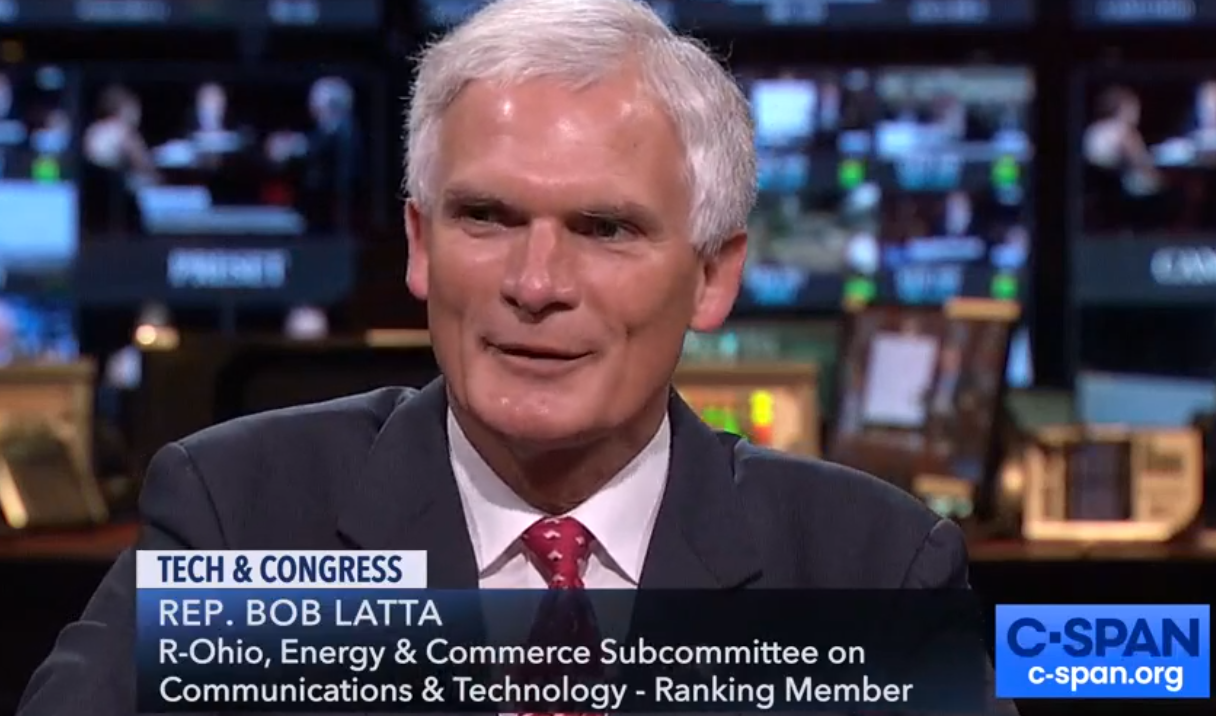Rep. Latta: Calif. Privacy Law Puts Federal Effort on Clock
The smarter way to stay on top of the multichannel video marketplace. Sign up below.
You are now subscribed
Your newsletter sign-up was successful
Rep. Bob Latta (R-Ohio), ranking member of the House Communications Subcommittee, said Congress needs to get data privacy legislation passed ASAP.
"We have to have a uniform standard out there so that people know what is going on," he said in an interview for C-SPAN's Communicators series. Lighting a fire under that effort, he suggested, is the fact that California's tough new privacy law goes into in less than six months.

He pointed out that after Congress' traditional August recess, there are only about 40 "hard" working days to get legislation done.
"We are up against that Dec. 31 date," he said. "If we don't get something done," and done right," not only will there be the California law, but other states will start doing the same thing in the absence of national legislation.
He said that legislation was important for companies so they wouldn't face a patchwork of different standards, but also for consumers so they will know what their rights are.
Latta was asked by asked by reporter Ashley Gold of The Information about legislation in the context of this week's $5 billion Federal Trade Commission settlement with Facebook, which drew a number of similar comments about the need for general national privacy standards, particularly since the FTC chairman's response to criticism that its fine and conditions were too lenient, said it was the best they could do with limited authority and that Congress needed to step in to give it more authority.
The FTC is an enforcement agency. In fact, the Facebook fine and conditions mostly had to do with the company not living up to an earlier settlement with the FTC, which is primarily an enforcement agency with limited rulemaking and fining authority.
The smarter way to stay on top of the multichannel video marketplace. Sign up below.
Latta referred back to when Facebook CEO Mark Zuckerberg testified before the House Energy & Commerce Committee. He said Zuckerberg had talked about being optimistic and idealistic when he started the company in a dorm room. Latta said he had written a note to himself on a copy of Zuckerberg's testimony as he listened to it: "But not realistic."
Latta suggested that realistic now meant transparency, so users know what data is being collected and what it is used for.
Asked what his "non-negotiables" were in such a bill, Latta said Democrats were currently working on the text of a bill, text he had not seen, and that they needed to have a sit-down on that, but declined to say what he would have to have.
Latta was asked if Big Tech was too big. Latta said these were companies whose products and services a large number of the American people liked to use.
He signaled he was ready to rush to "break things up." But he did want the committee to examine the issue, "getting the facts" before deciding whether something needs to be done about Big Tech "in the future."
The Trump Administration is opening an antitrust investigation into Facebook and other tech giants. Latta said that it is the agency's job to determine if those companies were operating within the laws on the books.
One argument by Big Tech critics is that they built up anticompetitive monopolies through serial purchases of smaller companies that, individually. did not raise antitrust red flags.
DOJ antitrust chief Makan Delrahim has said that it is not size that necessarily matters, but how companies used that size.
The Latta episode of The Communicators airs Saturday, July 27, at 6:30 p.m. on C-SPAN and Monday, July 29, at 8 a.m. and 8 p.m. on C-SPAN2.
Contributing editor John Eggerton has been an editor and/or writer on media regulation, legislation and policy for over four decades, including covering the FCC, FTC, Congress, the major media trade associations, and the federal courts. In addition to Multichannel News and Broadcasting + Cable, his work has appeared in Radio World, TV Technology, TV Fax, This Week in Consumer Electronics, Variety and the Encyclopedia Britannica.

